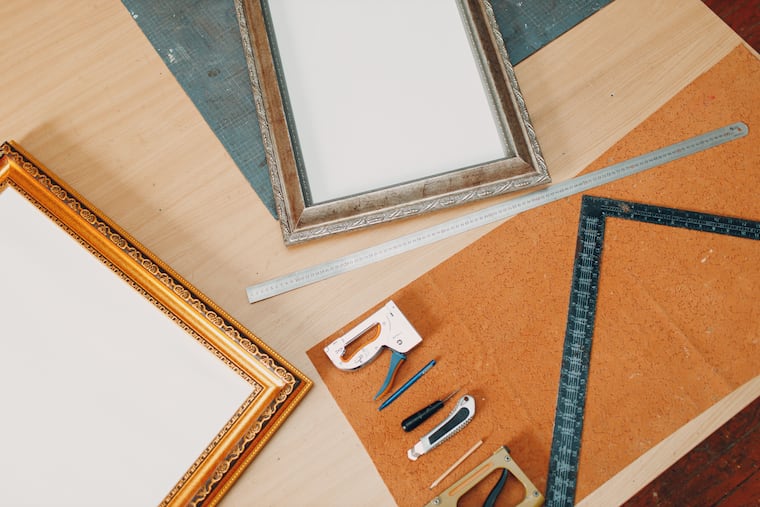From DIY to professional shop, here’s how to amplify your prized art with a frame
Prices and offerings vary greatly when choosing between a premade frame, online custom job, or a local framing shop.

Any kind of art — from the Mona Lisa to your family snapshots — looks better in a nice frame. To elevate, protect, and display paintings, photos, and other prizes, you’ll either need to find a good shop to do the work or buy supplies and DIY.
Many local framing shops provide expert advice, take care of your precious items, and don’t charge high prices. If you want to frame things yourself, online businesses offer products and instructions — or you can buy supplies from an arts and crafts store and watch online instructional videos for an assist on putting everything together.
If someone else will do the work, you’ll want a skilled pro who offers sage advice. Staff at the best shops will spend time with you exploring framing options — Single or double mat? Metal or wood frame? Plexiglass or real glass?
Until Nov. 5, Checkbook is offering free access to its ratings of area framing shops to Inquirer readers via Checkbook.org/inquirer/framing. Checkbook surveyed its own subscribers plus other randomly selected individuals. You’ll notice big shop-to-shop differences for customer satisfaction and prices.
DIY options are usually the cheapest. You can buy inexpensive frames at stores like Target, Pottery Barn, and IKEA, and they often look pretty good.
“I do kid artwork walls for some of my clients, and cheaper frames like this are a great option,” said Allison Marvin of art consultancy Sightline.
If you’re buying from an online outlet or picking up an inexpensive premade frame, make sure you use acid-free and lignin-free mats that won’t damage artwork over time. Most pro framers use nothing but acid-free materials.
If you have odd-sized art or want customized frames and mats, several websites allow you to enter measurements and shop from hundreds of frames—plus buy custom-cut mats, glass or plexiglass fronts, and more. The store ships your products and you assemble everything. In our experience, this is a relatively simple but not totally goof-proof transaction.
Precise measuring is crucial, and positioning art onto precut mats is harrowingly tedious. Plus plexiglass panels from online vendors sometimes attract fuzz that’s a pain to remove. If you’re using a mat, buy linen mounting tape ($10 to $15 at art stores or online) to affix art to the mat.
If you want a full-service frame-up, local stores or full-service internet-based companies can help. The internet services (e.g. Framebridge.com, PictureFrames.com, SimplyFramed.com) ship you tubes or flat mailers so you can send your artwork to them; they then frame the item and mail it back.
If you’ve got a digital photo or print, the process is simpler: Email it to the company, which then sizes it, prints it, and sends you a framed version a few weeks later. Simply Framed, in particular, offers a wide range of suggestions tailored to specific sorts of art and artifacts — such as a groovy plexibox for a textile or a gilt wooden frame for a fancy oil painting.
Why stick with a local shop? It’s easier to discuss your project in person, plus shipping your prized 1991 REM poster or preschooler’s latest masterpiece means it might get lost (and that definitely happens). Start by shopping around for a good price — you’ll find big differences from business to business.
Checkbook’s undercover shoppers asked a sampling of local picture framing shops plus major online outlets for their prices to frame two different pieces. For the larger piece, prices from surveyed full-service local shops ranged from $170 to $450 or more; for the smaller piece, prices ranged from $120 to $340.
The web-based stores consistently offered low prices. FrameItEasy.com’s prices were lowest among the online shops; its prices were $67 for the smaller piece and $111 for the larger one, and the customers must do final assembly themselves.
Among area brick-and-mortar stores, Hobby Lobby and Michael’s offered the lowest overall prices—lower even than many of the prices from web-based services. But don’t assume that big chain operations always charge lower prices than smaller outfits. For example, for the two pieces Checkbook shopped, Kent Studio in Holmes, Pa., offered among the lowest prices in Checkbook’s survey.
Delaware Valley Consumers’ Checkbook magazine and Checkbook.org is a nonprofit organization with a mission to help consumers get the best service and lowest prices. We are supported by consumers and take no money from the service providers we evaluate.